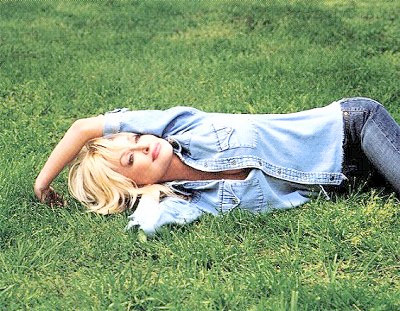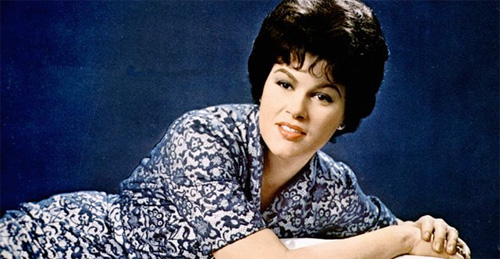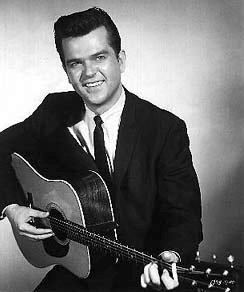Cool Water – The Sons of the Pioneers
 Sunday, March 13, 2011 at 7:51PM Tweet
Sunday, March 13, 2011 at 7:51PM Tweet by Jim Poulton
My wife and I grew up in different states – she in a small town in Montana, and I in a middle class subdivision of Salt Lake City. But we each had a favorite album that we listened to over and over as children. And we discovered a little while ago that it was the same album: Cool Water by The Sons of the Pioneers.
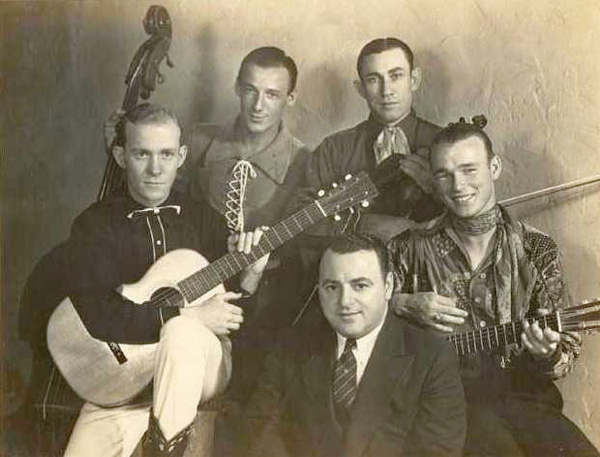 Left to right: Tim Spencer, Bob Nolan, Hugh Farr, Roy Rogers (Gus Mack, announcer). Photo courtesy of bobnolan-sop.net
Left to right: Tim Spencer, Bob Nolan, Hugh Farr, Roy Rogers (Gus Mack, announcer). Photo courtesy of bobnolan-sop.net
The Sons of the Pioneers have left a long (and dusty) trail in the history of cowboy music. Starting in 1934, their original members included Tim Spencer, Bob Nolan, Hugh Farr and Roy Rogers (of Dale Evans fame). They were about as famous as you could get in those days: their music appeared in over 90 western films, and they are the authors of some of the most iconic cowboy songs that have ever been written. Bob Nolan, the main songwriter in the group, wrote Cool Water and Tumbling Tumbleweeds, two songs that have defined the west as much as cattle and rattlesnakes.
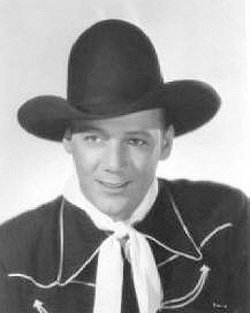 Bob Nolan. Photo courtesy of bobnolan-sop.net
Bob Nolan. Photo courtesy of bobnolan-sop.net
Here is Cool Water, from an original 78rpm Gramophone:
And here’s Tumbling Tumbleweeds:
You can also listen to dozens of different versions of each song by following these links: Cool Water; Tumbling Tumbleweeds.
As a group, The Sons of the Pioneers are still around today. They’ve won about every award possible in the country/cowboy music genre, including the Country Music Hall of Fame, the Western Music Association Hall of Fame, the Smithsonian Institute’s ‘National Treasure’ Designation, the National Cowboy Hall of Fame, and the Golden Boot Award. They even have their own star on Hollywood’s Walk of Fame. More than that, though, they are the group that was instrumental in putting cowboy music on the map. Before them, there really wasn’t much of a genre called cowboy music. After them, cowboy music was ridin’ easy in the saddle. As Doug Green of Riders in the Sky put it: ‘Any of us who sing Western music, it all goes back to the Pioneers.’
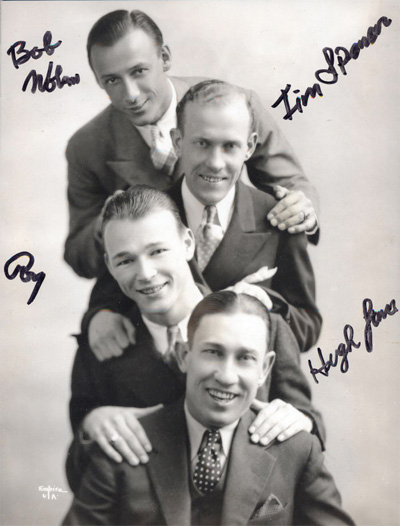 Photo courtesy of bobnolan-sop.net
Photo courtesy of bobnolan-sop.net
Actually, people were paying attention to cowboy songs prior to the appearance of The Sons of the Pioneers. In 1921, N. Howard (‘Jack’) Thorp collected and published a collection of cowboy poems and songs. The volume is now in the public domain, and you can download it for free here. Or you can purchase a more recent edition here.
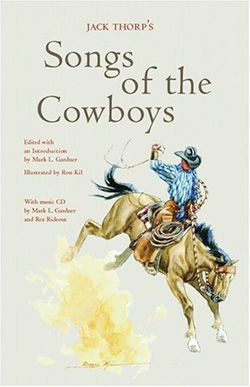
Here are the first two stanzas of The Cowboy’s Life, heard by Thorp ‘at a little round-up at Seven Lakes, New Mexico, by a puncher named Spence’:
The bawl of a steer
To a cowboy’s ear
Is music of sweetest strain;
And the yelping notes
Of the gray coyotes
To him are a glad refrain.And his jolly songs
Speed him along
As he thinks of the little gal
With golden hair
Who is waiting there
At the bars of the home corral.

